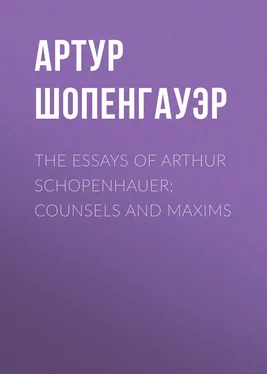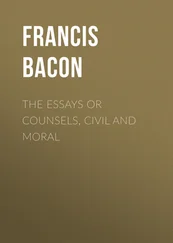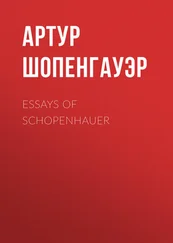Артур Шопенгауэр - The Essays of Arthur Schopenhauer; Counsels and Maxims
Здесь есть возможность читать онлайн «Артур Шопенгауэр - The Essays of Arthur Schopenhauer; Counsels and Maxims» — ознакомительный отрывок электронной книги совершенно бесплатно, а после прочтения отрывка купить полную версию. В некоторых случаях можно слушать аудио, скачать через торрент в формате fb2 и присутствует краткое содержание. Жанр: Философия, literature_19, foreign_antique, foreign_prose, на английском языке. Описание произведения, (предисловие) а так же отзывы посетителей доступны на портале библиотеки ЛибКат.
- Название:The Essays of Arthur Schopenhauer; Counsels and Maxims
- Автор:
- Жанр:
- Год:неизвестен
- ISBN:нет данных
- Рейтинг книги:3 / 5. Голосов: 1
-
Избранное:Добавить в избранное
- Отзывы:
-
Ваша оценка:
- 60
- 1
- 2
- 3
- 4
- 5
The Essays of Arthur Schopenhauer; Counsels and Maxims: краткое содержание, описание и аннотация
Предлагаем к чтению аннотацию, описание, краткое содержание или предисловие (зависит от того, что написал сам автор книги «The Essays of Arthur Schopenhauer; Counsels and Maxims»). Если вы не нашли необходимую информацию о книге — напишите в комментариях, мы постараемся отыскать её.
The Essays of Arthur Schopenhauer; Counsels and Maxims — читать онлайн ознакомительный отрывок
Ниже представлен текст книги, разбитый по страницам. Система сохранения места последней прочитанной страницы, позволяет с удобством читать онлайн бесплатно книгу «The Essays of Arthur Schopenhauer; Counsels and Maxims», без необходимости каждый раз заново искать на чём Вы остановились. Поставьте закладку, и сможете в любой момент перейти на страницу, на которой закончили чтение.
Интервал:
Закладка:
One might well fancy that these visions of wishes fulfilled were the work of some evil spirit, conjured up in order to entice us away from that painless state which forms our highest happiness.
A careless youth may think that the world is meant to be enjoyed, as though it were the abode of some real or positive happiness, which only those fail to attain who are not clever enough to overcome the difficulties that lie in the way. This false notion takes a stronger hold on him when he comes to read poetry and romance, and to be deceived by outward show – the hypocrisy that characterizes the world from beginning to end; on which I shall have something to say presently. The result is that his life is the more or less deliberate pursuit of positive happiness; and happiness he takes to be equivalent to a series of definite pleasures. In seeking for these pleasures he encounters danger – a fact which should not be forgotten. He hunts for game that does not exist; and so he ends by suffering some very real and positive misfortune – pain, distress, sickness, loss, care, poverty, shame, and all the thousand ills of life. Too late he discovers the trick that has been played upon him.
But if the rule I have mentioned is observed, and a plan of life is adopted which proceeds by avoiding pain – in other words, by taking measures of precaution against want, sickness, and distress in all its forms, the aim is a real one, and something may be achieved which will be great in proportion as the plan is not disturbed by striving after the chimera of positive happiness. This agrees with the opinion expressed by Goethe in the Elective Affinities , and there put into the mouth of Mittler – the man who is always trying to make other people happy: To desire to get rid of an evil is a definite object, but to desire a better fortune than one has is blind folly . The same truth is contained in that fine French proverb: le mieux est l'ennemi du bien – leave well alone. And, as I have remarked in my chief work, 4 4 Welt als Wille und Vorstellung , vol. ii., ch. 16.
this is the leading thought underlying the philosophical system of the Cynics. For what was it led the Cynics to repudiate pleasure in every form, if it was not the fact that pain is, in a greater or less degree, always bound up with pleasure? To go out of the way of pain seemed to them so much easier than to secure pleasure. Deeply impressed as they were by the negative nature of pleasure and the positive nature of pain, they consistently devoted all their efforts to the avoidance of pain. The first step to that end was, in their opinion, a complete and deliberate repudiation of pleasure, as something which served only to entrap the victim in order that he might be delivered over to pain.
We are all born, as Schiller says, in Arcadia. In other words, we come into the world full of claims to happiness and pleasure, and we cherish the fond hope of making them good. But, as a rule, Fate soon teaches us, in a rough and ready way that we really possess nothing at all, but that everything in the world is at its command, in virtue of an unassailable right, not only to all we have or acquire, to wife or child, but even to our very limbs, our arms, legs, eyes and ears, nay, even to the nose in the middle of our face. And in any case, after some little time, we learn by experience that happiness and pleasure are a fata morgana , which, visible from afar, vanish as we approach; that, on the other hand, suffering and pain are a reality, which makes its presence felt without any intermediary, and for its effect, stands in no need of illusion or the play of false hope.
If the teaching of experience bears fruit in us, we soon give up the pursuit of pleasure and happiness, and think much more about making ourselves secure against the attacks of pain and suffering. We see that the best the world has to offer is an existence free from pain – a quiet, tolerable life; and we confine our claims to this, as to something we can more surely hope to achieve. For the safest way of not being very miserable is not to expect to be very happy. Merck, the friend of Goethe's youth, was conscious of this truth when he wrote: It is the wretched way people have of setting up a claim to happiness — and, that to, in a measure corresponding with their desires — that ruins everything in this world. A man will make progress if he can get rid of this claim, 5 5 Letters to and from Merck.
and desire nothing but what he sees before him . Accordingly it is advisable to put very moderate limits upon our expectations of pleasure, possessions, rank, honor and so on; because it is just this striving and struggling to be happy, to dazzle the world, to lead a life full of pleasure, which entail great misfortune. It is prudent and wise, I say, to reduce one's claims, if only for the reason that it is extremely easy to be very unhappy; while to be very happy is not indeed difficult, but quite impossible. With justice sings the poet of life's wisdom:
Auream quisquis mediocritatem
Diligit, tutus caret obsoleti
Sordibus tecti, caret invidenda
Sobrius aula.
Savius ventis agitatur ingens
Pinus: et celsae graviori casu
Decidunt turres; feriuntque summos
Fulgura monies. 6 6 Horace. Odes II. x.
– the golden mean is best – to live free from the squalor of a mean abode, and yet not be a mark for envy. It is the tall pine which is cruelly shaken by the wind, the highest summits that are struck in the storm, and the lofty towers that fall so heavily.
He who has taken to heart the teaching of my philosophy – who knows, therefore, that our whole existence is something which had better not have been, and that to disown and disclaim it is the highest wisdom – he will have no great expectations from anything or any condition in life: he will spend passion upon nothing in the world, nor lament over-much if he fails in any of his undertakings. He will feel the deep truth of what Plato 7 7 Republic , x. 604.
says: [Greek: oute ti ton anthropinon haxion on megalaes spondaes] – nothing in human affairs is worth any great anxiety; or, as the Persian poet has it,
Though from thy grasp all worldly things should flee,
Grieve not for them, for they are nothing worth:
And though a world in thy possession be, J
oy not, for worthless are the things of earth.
Since to that better world 'tis given to thee
To pass, speed on, for this is nothing worth. 8 8 Translator's Note . From the Anvár-i Suhailí — The Lights of Canopus – being the Persian version of the Table of Bidpai . Translated by E.B. Eastwick, ch. iii. Story vi., p. 289.
The chief obstacle to our arriving at these salutary views is that hypocrisy of the world to which I have already alluded – an hypocrisy which should be early revealed to the young. Most of the glories of the world are mere outward show, like the scenes on a stage: there is nothing real about them. Ships festooned and hung with pennants, firing of cannon, illuminations, beating of drums and blowing of trumpets, shouting and applauding – these are all the outward sign, the pretence and suggestion, – as it were the hieroglyphic, – of joy : but just there, joy is, as a rule, not to be found; it is the only guest who has declined to be present at the festival. Where this guest may really be found, he comes generally without invitation; he is not formerly announced, but slips in quietly by himself sans facon ; often making his appearance under the most unimportant and trivial circumstances, and in the commonest company – anywhere, in short, but where the society is brilliant and distinguished. Joy is like the gold in the Australian mines – found only now and then, as it were, by the caprice of chance, and according to no rule or law; oftenest in very little grains, and very seldom in heaps. All that outward show which I have described, is only an attempt to make people believe that it is really joy which has come to the festival; and to produce this impression upon the spectators is, in fact, the whole object of it.
Читать дальшеИнтервал:
Закладка:
Похожие книги на «The Essays of Arthur Schopenhauer; Counsels and Maxims»
Представляем Вашему вниманию похожие книги на «The Essays of Arthur Schopenhauer; Counsels and Maxims» списком для выбора. Мы отобрали схожую по названию и смыслу литературу в надежде предоставить читателям больше вариантов отыскать новые, интересные, ещё непрочитанные произведения.
Обсуждение, отзывы о книге «The Essays of Arthur Schopenhauer; Counsels and Maxims» и просто собственные мнения читателей. Оставьте ваши комментарии, напишите, что Вы думаете о произведении, его смысле или главных героях. Укажите что конкретно понравилось, а что нет, и почему Вы так считаете.












